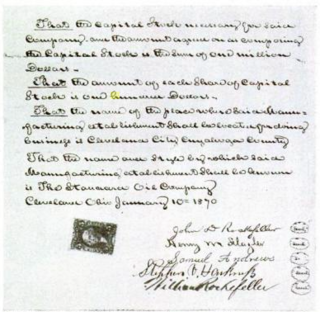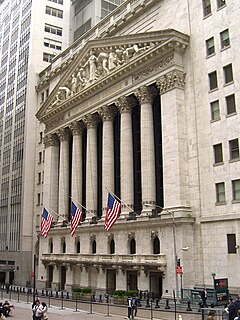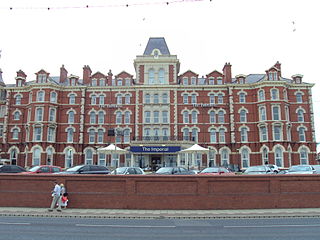
A corporation is an organization—usually a group of people or a company—authorized by the state to act as a single entity and recognized as such in law for certain purposes. Early incorporated entities were established by charter. Most jurisdictions now allow the creation of new corporations through registration. Corporations come in many different types but are usually divided by the law of the jurisdiction where they are chartered based on two aspects: by whether they can issue stock, or by whether they are formed to make a profit. Depending on the number of owners, a corporation can be classified as aggregate or sole.
Corporate personhood is the legal notion that a corporation, separately from its associated human beings, has at least some of the legal rights and responsibilities enjoyed by natural persons. In most countries, corporations, as legal persons, have a right to enter into contracts with other parties and to sue or be sued in court in the same way as natural persons or unincorporated associations of persons.

A joint-stock company is a business entity in which shares of the company's stock can be bought & sold by shareholders. Each shareholder owns company stock in proportion, evidenced by their shares. Shareholders are able to transfer their shares to others without any effects to the continued existence of the company.

John Archibald Campbell was an American jurist. He was a successful lawyer in Georgia and Alabama, where he served in the state legislatures. Appointed by Franklin Pierce to the United States Supreme Court in 1853, he served until the outbreak of the American Civil War, when he became an official of the Confederate States of America. After serving six months in a military prison, he resumed a successful law practice in New Orleans, where he opposed Reconstruction.

Corporate law is the body of law governing the rights, relations, and conduct of persons, companies, organizations and businesses. The term refers to the legal practice of law relating to corporations, or to the theory of corporations. Corporate law often describes the law relating to matters which derive directly from the life-cycle of a corporation. It thus encompasses the formation, funding, governance, and death of a corporation.

Kirton or Kirton in Holland is an English village and civil parish in the Borough of Boston, Lincolnshire. The population of the civil parish at the 2011 census was 5,371.
Directors and officers liability Insurance is liability insurance payable to the directors and officers of a company, or to the organization(s) itself, as indemnification (reimbursement) for losses or advancement of defense costs in the event an insured suffers such a loss as a result of a legal action brought for alleged wrongful acts in their capacity as directors and officers. Such coverage can extend to defense costs arising out of criminal and regulatory investigations/trials as well; in fact, often civil and criminal actions are brought against directors/officers simultaneously. Intentional illegal acts, however, are typically not covered under D&O policies.

In corporate governance, a company's articles of association is a document which, along with the memorandum of association form the company's constitution, and defines the responsibilities of the directors, the kind of business to be undertaken, and the means by which the shareholders exert control over the board of directors.
A statutory corporation is a statute created by the government. Their precise nature varies by jurisdiction, thus, they might be ordinary companies/corporations owned by a government with or without other shareholders, or they might be a body without shareholders that is controlled by national or sub-national government to the extent provided for in the creating legislation.

Tag along rights comprise a group of clauses in a contract which together have the effect of allowing the minority shareholder(s) in a corporation to also take part in a sale of shares by the majority shareholder to a third party under the same terms and conditions. Consider an example: A and B are both shareholders in a company, with A being the majority shareholder and B the minority shareholder. C, a third party, offers to buy A's shares at an attractive price, and A accepts. In this situation, tag-along rights would allow B to also participate in the sale under the same terms and conditions as A.

The United Kingdom company law regulates corporations formed under the Companies Act 2006. Also governed by the Insolvency Act 1986, the UK Corporate Governance Code, European Union Directives and court cases, the company is the primary legal vehicle to organise and run business. Tracing their modern history to the late Industrial Revolution, public companies now employ more people and generate more of wealth in the United Kingdom economy than any other form of organisation. The United Kingdom was the first country to draft modern corporation statutes, where through a simple registration procedure any investors could incorporate, limit liability to their commercial creditors in the event of business insolvency, and where management was delegated to a centralised board of directors. An influential model within Europe, the Commonwealth and as an international standard setter, UK law has always given people broad freedom to design the internal company rules, so long as the mandatory minimum rights of investors under its legislation are complied with.

Australian corporations law has historically borrowed heavily from UK company law. Its legal structure now consists of a single, national statute, the Corporations Act 2001. The statute is administered by a single national regulatory authority, the Australian Securities and Investments Commission (ASIC).

United States corporate law regulates the governance, finance and power of corporations in US law. Every state and territory has its own basic corporate code, while federal law creates minimum standards for trade in company shares and governance rights, found mostly in the Securities Act of 1933 and the Securities and Exchange Act of 1934, as amended by laws like the Sarbanes–Oxley Act of 2002 and the Dodd–Frank Wall Street Reform and Consumer Protection Act. The US Constitution was interpreted by the US Supreme Court to allow corporations to incorporate in the state of their choice, regardless of where their headquarters are. Over the 20th century, most major corporations incorporated under the Delaware General Corporation Law, which offered lower corporate taxes, fewer shareholder rights against directors, and developed a specialized court and legal profession. Nevada has done the same. Twenty-four states follow the Model Business Corporation Act, while New York and California are important due to their size.

Ashbury Railway Carriage and Iron Co Ltd v Riche (1875) LR 7 HL 653 is a UK company law case, which concerned the objects clause of a company's memorandum of association.

John Catron was an American jurist who served as an Associate Justice of the Supreme Court of the United States from 1837 to 1865, during the Taney Court.
Citizens United v. Federal Election Commission, 558 U.S. 310 (2010), was a landmark decision of the Supreme Court of the United States concerning the relationship between campaign finance and free speech. It was argued in 2009 and decided in 2010. The court held that the free speech clause of the First Amendment prohibits the government from restricting independent expenditures for political campaigns by corporations, including nonprofit corporations, labor unions, and other associations.

Imperial Hydropathic Hotel Co, Blackpool v Hampson (1883) 23 Ch D 1 is a UK company law case, concerning the interpretation of a company's articles of association. On the specific facts it has been superseded by the Companies Act 2006 section 168, which allows a director to be removed through an ordinary majority resolution of the general meeting.

Canadian corporate law concerns the operation of corporations in Canada, which can be established under either federal or provincial authority.

British Virgin Islands company law is primarily codified in the BVI Business Companies Act, 2004, and to a lesser extent by the Insolvency Act, 2003 and the Securities and Investment Business Act, 2010. The British Virgin Islands has approximately 30 registered companies per head of population, which is probably the highest ratio of any country in the world. Annual company registration fees provide a significant part of Government revenue in the British Virgin Islands, which accounts for the comparative lack of other taxation. Accordingly, company law forms a much more prominent part of the law of the British Virgin Islands than might otherwise be expected.
The history of corporate law in the United States concerns the development of the corporation, primarily as a business organization, under the different United States corporate law, including federal regulation.













